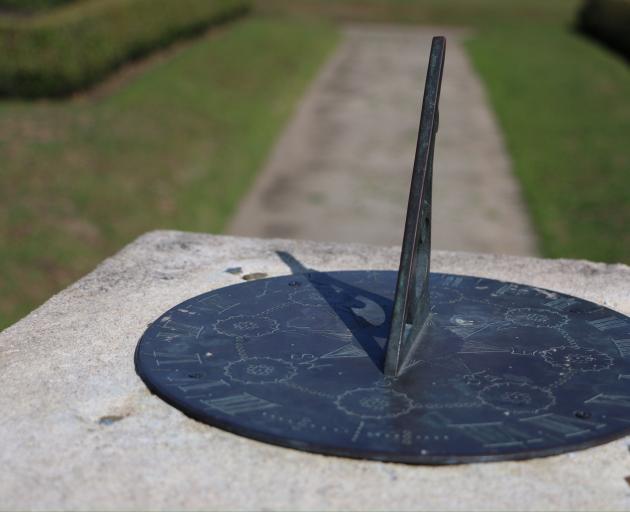
She chose to be cremated, her ashes thrown to the wind in a spot she was fond of, leaving nothing to mark her life.
There’s modesty there and wisdom.

But few people get to do that. Let the ashes scatter and the winds blow. There is no shame in a modest life.
But now a different immortality looms. It’s electronic. Every grinning selfie, every ill-judged text message is preserved somewhere in vaults of ones and zeroes.
And there’s other stuff too.
I don’t know who is doing this, or who is paying, but there seems to be a worldwide effort to digitise all knowledge and all history. Everything that has been ever said or thought or written down is being archived on the internet, endless witterings of the dead, however long ago and properly forgotten.
As if our species held such paramount importance that every deed or word were precious.
A sundial brought this fact to mind. The thing first saw the light in Scotland in the 19th century, then understandably emigrated. It fetched up in an Oamaru garden.
On the sundial’s plinth there’s a motto: "And so is the blue sky greater than any cloud therein, and more permanent too."
The sundial’s owner has tried but failed to trace the origin of the line, and wrote to me to see if I could help.
Now, I’m no sleuth. My electronic skills are dwarfed by any 5-year-old’s.
But I like a challenge and I was flattered to be asked so I said I’d give the thing a go, and, well, have you heard of Juliana Horatia Ewing, known to her friends as Julie?
No, neither had I.
Born in 1841, she was the second of 10 children spawned by a Yorkshire vicar and his wife. Sadly Julie suffered from ill health and despite her strong Anglican faith she died at the age of 43.
But she left a legacy to the world in the form of some children’s stories which were apparently popular in their day.
And someone somewhere has gone to the trouble of granting them electronic immortality. Here are the last few lines of chapter V of her novel Jackanapes.
"Pressed by the conviction that what little he could do it was his duty to do, the Major, kneeling, bared his head, and spoke loudly, clearly and very reverently, -
"The grace of our Lord Jesus Christ — "
Jackanapes moved his left hand to his right one, which still held the Major’s, -
"The love of God — "
And with that — Jackanapes died."
Which I think tells you all you need to know about Ms Ewing’s work — it’s poorly punctuated Dickensian schmaltz with plentiful dollops of God.
The epigraph to chapter VI of Jackanapes is a quotation from a certain Jean Paul Richter.
Richter, too, has a Wikipedia entry. Born in Franconia in 1763 he finally ran out of steam in 1825 but not before he’d written rather a lot of books, about which the critics of the day were divided.
Some thought him a genius, others a buffoon.
But clearly Ms Ewing had read enough of him to quote him in the original German. "Und so ist der blaue Himmel grisser als jedes Gewolk darin, and dauerhafter dazu," a phrase which is translated in a footnote. "And so the blue sky is greater than any cloud therein, and more enduring too."
You can imagine how clever I felt. I wrote the sundial owner an email of unremitting smugness.
At the same time I privately marvelled that so much old and deeply unimportant stuff had found its way online (whatever online actually means, and wherever the hell it is.)
I have found only one other quotation from Richter’s work, a line from his novel Hesperus. "Der lange Schlaf des Todes schliesst unsere Narben zu, und der kurze des Lebens unsere Wunden." "The long sleep of death closes our scars, and the short sleep of life our wounds."
Which was true when written.
But now, thanks to the internet, is somewhat less so.
• Joe Bennett is a Lyttelton writer.











